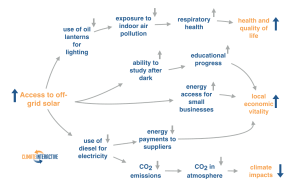More Homework, Less Coughing (and Less Climate Change): The Power of Solar Energy in Remote Villages
By
Elizabeth Sawin
February 11, 2015
 Energy from the sun, distributed via micro-grids, saves money and improves health and education while reducing fossil fuel reliance and greenhouse gas emissions.
Energy from the sun, distributed via micro-grids, saves money and improves health and education while reducing fossil fuel reliance and greenhouse gas emissions.
An innovative project is providing clean electricity to households and small factories in remote communities in Tanzania that lack access to the traditional electricity grid. Solar panels feed batteries that deliver clean energy to the surrounding community via micro-grids. In the process many problems are solved at once.
Health and Education – Before the arrival of clean electricity, families had to choose between limiting their children’s study time to daylight hours or living with the health effects of breathing soot and smoke. Before the project, children complained that the smoke from kerosene lamps made them cough, now they can do their homework in the evenings with no ill effects.
**Climate Change ** – Before this project, the only source of electricity was diesel generators, which also produced climate change pollution.
Economic Vitality – Before the solar project, fuel was expensive, and payments for it transferred precious cash from the local economy to distant fossil fuel companies. The solar project utilizes a free, local resource, the sun, with modest fees for maintenance of the infrastructure. Access to solar electricity is also enabling the launch or expansion of small businesses, including a sawmill, and there are hopes to also connect schools, health centers, and churches.
Pumping water. Studying at night. Operating machinery or keeping medicine refrigerated. The power of energy to improve people’s lives is huge. And when that energy is clean and renewable then those local immediate benefits come along with the global long-term benefit of helping protect our climate. This is the logic of multiple benefits: in interconnected systems, the best strategies produce a mix of benefits on different time frames and different scales.
That’s an inspiring vision, but a completely pragmatic one as well. No one knows this better than the Tanzanian citizens who no longer have to choose between their children’s health and their education. For them the new systems are life-changing, as the words of this mother in one of the communities makes clear:
_ _“I am very happy to be part of this project. I hope my children will now spend more time studying in bright light and they will no longer suffer from the smoke.”
This post is part of a series on examples of multisolving, or climate-smart policies that simultaneously work to mitigate climate change while providing co-benefits such as the ones described above.
_ _


